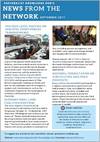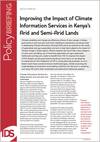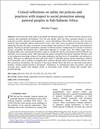Tsetse-transmitted trypanosomosis, is widely considered as a major constraint on livestock production and rural development in sub-Saharan Africa. This study conducted in the IGAD region maps the maximum economic gain if losses due to trypanosomosis in cattle were to be removed. At a regional level, the map shows where the benefits of controlling the disease would be highest. Different approaches to dealing with either tsetse or trypanosomosis would enable some or all of these benefits to be realized, over smaller or larger areas.
Year of publication: 2017Organization: Food and Agriculture Organization of the United Nations (FAO)
Topic: Economy, Healthcare
Language: English
Type of document: Technical
Geographical coverage: Eastern Africa
Pastoralist communities in Karamoja and Turkana negotiate with their neighbors to access water and pasture to keep their livestock alive. The communities are using their negotiation, networking and relationship building skills to access resources critical for their survival.
Year of publication: 2017Organization: The Open Society Initiative for Eastern Africa (OSIEA)
Topic: Food security, Indigenous peoples, Resilience
Language: English
Type of document: Videos
Geographical coverage: Eastern Africa
Newsletter containing updates of activities, events and experiences from among pastoral civil society organizations.
Year of publication: 2017Organization: Food and Agriculture Organization of the United Nations (FAO)
Topic: Food security, Indigenous knowledge, Indigenous peoples, Participation
Language: English
Type of document: Newletters
Geographical coverage: Global
Did you know that securing the future of pastoralism is central to attaining food security for the over 25% of the population that lives in dry lands? Pastoralism has been proven to increase the adaptive capacity for these communities enabling them to build resilience to attain food security.
Year of publication: 2017Organization: Individual authors
Topic: Food security
Language: English
Type of document: Videos
Geographical coverage: Eastern Africa
Climate variability and change are affecting millions of poor people in Kenya, particularly in arid and semi-arid lands, including pastoralists and agro-pastoralists. Significant investments are being made in developing Climate Information Services (CIS) which aim to help them adapt to the impact of climate change in these regions.
This report studies the efficacy of CIS to benefit poor pastoralists. It makes several recommendations on how the implementation of CIS can be improved to better support communities.
Organization: Individual authors
Topic: Climate change, Environmental services, Indigenous peoples, Organization, Resilience
Language: English
Type of document: Technical
Geographical coverage: Eastern Africa
Pastoralism remains the most resilient and sustainable livelihood system for communities living in arid and semi-arid areas. With over 14 million eastern Africans facing food insecurity the video shows the case of Karamoja in Uganda to demonstrate that developing pastoral production system is central to addressing food insecurity issues in the region.
Year of publication: 2017Organization: The Open Society Initiative for Eastern Africa (OSIEA)
Topic: Food security, Resilience
Language: English
Type of document: Videos
Geographical coverage: Eastern Africa
A video highlighting the importance of livestock in a pastoralist community. “Livestock is our life; with livestock we have everything. Last year, when we had a bad drought, crops failed, but it is livestock that saved us,” revealed Loipekume Loware, a pastoralist in Karamoja, Uganda.
Year of publication: 2017Organization: Individual authors
Topic: Food security, Resilience
Language: English
Type of document: Videos
Geographical coverage: Eastern Africa
Over the past decade, there has been increased attention to social protection in policy dialogues and programmes across Sub-Saharan Africa (SSA). However, there has been relatively little systematic analysis and research review work with a focus on pastoral livelihood systems. In addressing this gap, this paper re-examines current debates and practices in SSA’s emerging social protection agenda, focusing on pastoral communities and their livelihood systems.
Year of publication: 2017Organization: Individual authors
Topic: Climate change, Resilience
Language: English
Type of document: Scientific
Geographical coverage: Eastern Africa









